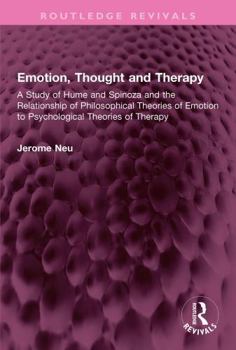Emotion, Thought and Therapy: A Study of Hume and Spinoza and the Relationship of Philosophical Theories of Emotion to Psychological Theories of Thera
Select Format
Select Condition 
Book Overview
First published in 1977, Emotion, Thought and Therapy is a study of Hume and Spinoza and the relationship of philosophical theories of the emotions to psychological theories of therapy. Jerome Neu argues that the Spinozists are closer to the truth; that is, that thoughts are of greater importance than feelings in the classification and discrimination of emotional states. He then contends that if the Spinozists are closer to the truth, we have the beginning of an argument to show that Freudian or analytic therapies make philosophic sense. Throughout the book, careful attention is paid to modern discussions in philosophy of mind and psychology, and materials from anthropology and other relevant disciplines are considered. At the centre of the discussion is the notion of 'thought-dependence'. Therapies for psychological disorders are placed along a spectrum in accordance with the role they assign to thoughts. The Spinozist view of the emotions can be seen as at the extreme thought end of a corresponding spectrum of theories of the emotions. The book suggests that this stream may help explain the spectrum of therapeutic theories and the possibilities that exist for psychological development and change. This book will be of interest to students of philosophy, psychology and counselling.













